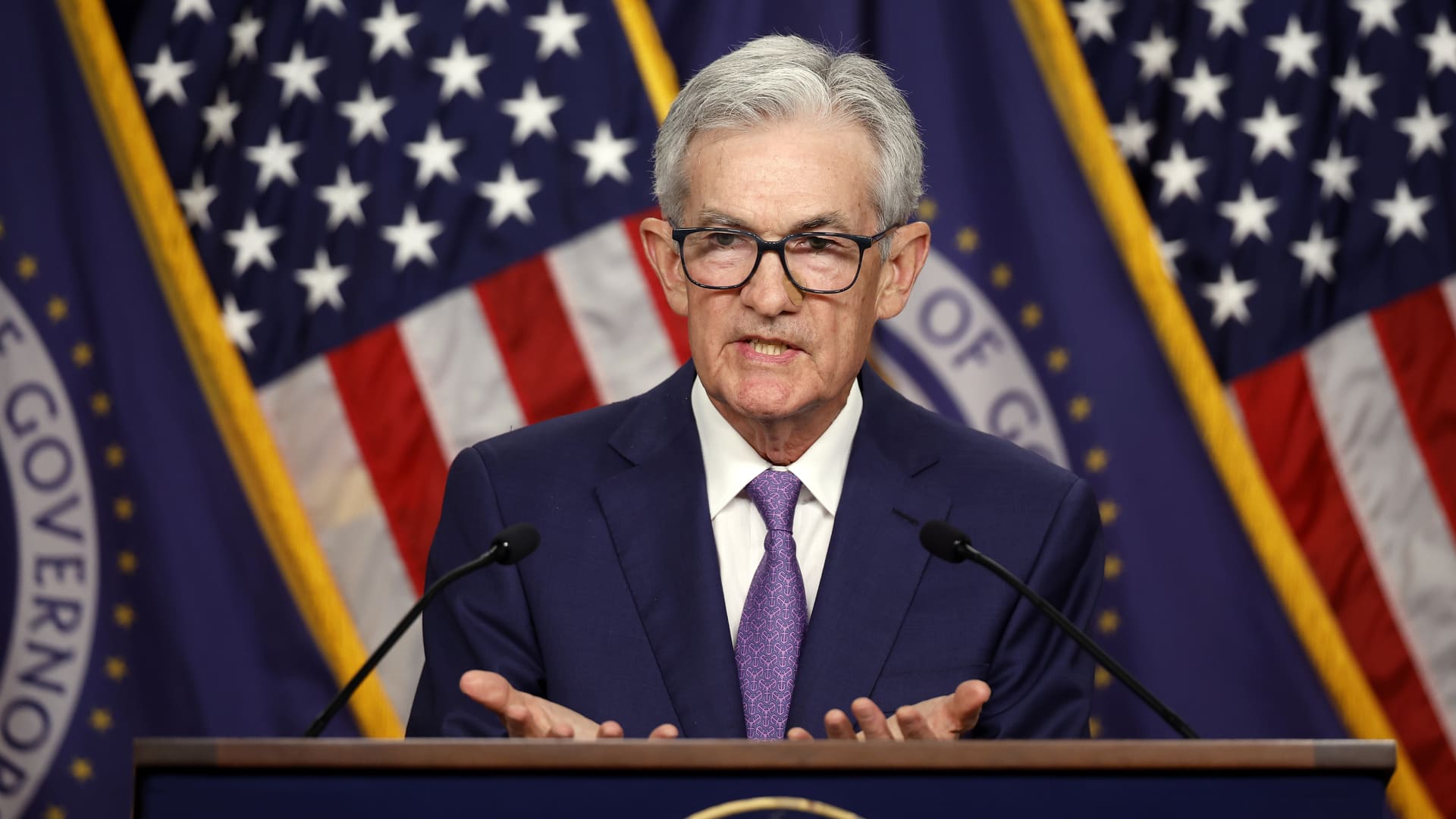How thousands of Americans got caught in fintech’s false promise and lost access to bank accounts
For customers, fintech promised the best of both worlds: The innovation, ease of use and fun of the newest apps combined with the safety of government-backed accounts held at real banks. The collapse of middleman Synapse has revealed fintech’s promise of safety as a mirage. More than 100,000 Americans with $265 million in deposits have been locked out of their accounts. The implications of this disaster may be far-reaching. The most popular banking apps in the country, including Block’s Cash App, PayPal and Chime partner with banks instead of owning them. CNBC reached out to fintech customers whose lives have been upended by the Synapse debacle. They all believed their money was protected by an FDIC safety net. Natasha Craft, a 25-year-old FedEx driver from Mishawaka, Indiana. She has been locked out of her Yotta banking account since May 11. Courtesy: Natasha Craft
When Natasha Craft first got a Yotta banking account in 2021, she loved using it so much she told her friends to sign up.
The app made saving money fun and easy, and Craft, a now 25-year-old FedEx driver from Mishawaka, Indiana, was busy getting her financial life in order and planning a wedding. Craft had her wages deposited directly into a Yotta account and used the startup’s debit card to pay for all her expenses.
The app — which gamifies personal finance with weekly sweepstakes and other flashy features — even occasionally covered some of her transactions.
“There were times I would go buy something and get that purchase for free,” Craft told CNBC.
Today, her entire life savings — $7,006 — is locked up in a complicated dispute playing out in bankruptcy court, online forums like Reddit and regulatory channels. And Yotta, an array of other startups and their banks have been caught in a moment of reckoning for the fintech industry.
For customers, fintech promised the best of both worlds: The innovation, ease of use and fun of the newest apps combined with the safety of government-backed accounts held at real banks.
The startups prominently displayed protections afforded by the Federal Deposit Insurance Corporation, lending credibility to their novel offerings. After all, since its 1934 inception, no depositor “has ever lost a penny of FDIC-insured deposits,” according to the agency’s website.
But the widening fallout over the collapse of a
CNBC
Powell says Fed has made ‘quite a bit of progress’ on inflation but needs more confidence before cutting
Fed Chair Jerome Powell expressed satisfaction with the progress on inflation but said he wants to see more before being confident enough to start cutting interest rates. “We want to be more confident that inflation is moving sustainably down toward 2% before we start the process of reducing or loosening policy,” he said. While Powell said he sees progress on inflation, he’s wary of moving too soon and threatening the downward path of price increases. U.S. Federal Reserve Bank Chair Jerome Powell announces that interest rates will remain unchanged during a news conference at the Federal Reserves’ William McChesney Martin building on June 12, 2024 in Washington, DC. Kevin Dietsch | Getty Images
Federal Reserve Chair Jerome Powell expressed satisfaction Tuesday with the progress on inflation over the past year but said he wants to see more before being confident enough to start cutting interest rates.
“We’ve made quite a bit of progress and in bringing inflation back down to our target,” Powell said at a central banking forum in Sintra, Portugal.
“The last [inflation] reading and the one before it to a lesser, lesser extent, suggest that we are getting back on the disinflationary path. We want to be more confident that inflation is moving sustainably down toward 2% before we start the process of reducing or loosening policy,” he added.
Powell spoke at a forum that also included European Central Bank President Christine Lagarde and Brazil central bank Governor Roberto Campos Neto. The forum is presented by the ECB and the discussion was moderated by CNBC’s Sara Eisen.
The comments come with markets closely watching moves from the Fed and its global counterparts as inflation shows signs of easing and some central banks, including the ECB, have slowly started rolling back interest rates.
The Commerce Department’s personal consumption expenditures price index, which the Fed focuses on as its main inflation gauge, rose at a 2.6% 12-month level in May. That level has come down steadily after being around 4% a year ago, though policymakers do not expect it to reach the Fed’s 2% goal until 2026.
While Powell said he sees progress on inflation, he’s wary of moving too soon and threatening the downward path of price increases, which hit their highest pace since the early 1980s two years ago.
“We’re well aware that
CNBC
The biofuels growth engine has stalled
Standard DigitalWeekend Print + Standard Digital
wasnow $85 per month
Billed Quarterly at $199. Complete digital access plus the FT newspaper delivered Monday-Saturday.
What’s included
Global news & analysisExpert opinionFT App on Android & iOSFT Edit appFirstFT: the day’s biggest stories20+ curated newslettersFollow topics & set alerts with myFTFT Videos & Podcasts20 monthly gift articles to shareLex: FT’s flagship investment column15+ Premium newsletters by leading expertsFT Digital Edition: our digitised print editionWeekday Print EditionFT WeekendFT Digital EditionGlobal news & analysisExpert opinionSpecial featuresExclusive FT analysisFT Digital EditionGlobal news & analysisExpert opinionSpecial featuresExclusive FT analysisGlobal news & analysisExpert opinionFT App on Android & iOSFT Edit appFirstFT: the day’s biggest stories20+ curated newslettersFollow topics & set alerts with myFTFT Videos & Podcasts10 monthly gift articles to shareGlobal news & analysisExpert opinionFT App on Android & iOSFT Edit appFirstFT: the day’s biggest stories20+ curated newslettersFollow topics & set alerts with myFTFT Videos & Podcasts20 monthly gift articles to shareLex: FT’s flagship investment column15+ Premium newsletters by leading expertsFT Digital Edition: our digitised print editionEverything in PrintWeekday Print EditionFT WeekendFT Digital EditionGlobal news & analysisExpert opinionSpecial featuresExclusive FT analysisPlusEverything in Premium DigitalEverything in Standard DigitalGlobal news & analysisExpert opinionSpecial featuresFirstFT newsletterVideos & PodcastsFT App on Android & iOSFT Edit app10 gift articles per monthExclusive FT analysisPremium newslettersFT Digital Edition10 additional gift articles per monthMake and share highlightsFT WorkspaceMarkets data widgetSubscription ManagerWorkflow integrationsOccasional readers go freeVolume discountFT Weekend Print deliveryPlusEverything in Standard DigitalFT Weekend Print deliveryPlusEverything in Premium Digital
Nordic Alpha Partners closes second fund at €266m
Nordics and Germany-based growth equity fund Nordic Alpha Partners has closed Fund II with €266m in commitments from Dutch bank ABN Amro, asset manager Unigestion, Danish holding company Novo Holdings and members of the Danish shipping family Maersk.
Other investors include Allianz GI, European Investment Fund, German state fund KfW Capital and Copenhagen Infrastructure Partners.
Fund II is classed as an Article 9 fund under the EU Sustainable Finance Disclosure Regulation and has already made three investments – Sunroof and Air Water Green in Sweden and STABL Energy in Germany.
In a statement, Troels Øberg, a senior partner at NAP who is responsible for the firm’s fundraising activities, said: “It is clear that the way we are organised, our value creation toolkit, and our operational investment approach stand out as a new model that can release value in the complex growth phase.
“The trust and ability to attract such a long list of international blue-chip investors is a testament the overall Nordic Alpha Partners mission, position and approach to driving value within the critical and difficult growth phase.”
Laurits Bach Sørensen, another senior partner at NAP who is responsible for value creation, added that the firm was collaborating with The Technical University of Denmark as well as US-based academic institutions on “exploring the viability of establishing an executive education based on our experience and methodology”.
Sørensen explained: “Being a green technology companies navigating through the growth phase is like operating a ship in a perfect storm. They need to simultaneously manage capex intensive complex hardtech, new changing value chains and fast paced organisational and geographical expansion, and so far no academic institution have [sic] a dedicated offering that will equip board members, investors and founders with the necessary skills and language to harness and manage such complexity.”
Nordic Alpha Partners was founded in 2017 and has offices in Copenhagen and Munich. It has raised around €1bn for its funds and portfolio companies to date, including 90% of all IPO/green capital investments and a third of all new IPO/capital stock for listings in Denmark. The firm has made exits of over €250m in the last 12 months, including German wireless charging start-up Wiferion to Tesla, and European SaaS provider Spirii to international payment service provider Edenred.
Lincoln International adds private funds MD
Global investment banking advisory firm Lincoln International has added Jonathan Graham as Managing Director to its private funds advisory group in London.
Graham was most recently Managing Director at Asante Capital Group, where he focused on GP-led transactions.
Lincoln’s private funds advisory group was established in 2022 and has closed over 15 private capital vehicles in the last year, according to a statement, which include single-asset vehicles, primary funds and GP-led continuation funds.
Main Capital Partners acquires RiskConcile
Main Capital Partners has made its first Belgian platform investment with the acquisition of a majority stake in RiskConcile, a Belgian software provider of regulatory and risk solutions for the financial industry.
The current management team of RiskConcile will retain a significant minority stake and stay closely involved post-closing.
The deal is the firm’s fourth Belgian acquisition overall since it opened its office in Antwerp in September 2022.
Founded in 2015 by Jan De Spiegeleer and Karl Ottevaere, RiskConcile offers proprietary software solutions covering PRIIPs, AIFMD Annex IV, transaction cost analysis, liquidity stress testing, solvency and SFDR reporting. The company is headquartered in Leuven, Belgium and serves asset managers, banks, fund managers, insurance companies and fund service providers across the Benelux region, the UK, Ireland and France.
WestBridge makes two promotions
UK-based lower mid-market private equity firm Westbridge has promoted Rebecca Sinclair, who joined the firm in 2019, to investment director, and Luke Gilbert, who joined in 2023, to investment manager.
These promotions follow the firm’s completion of seven transactions over the past twelve months, including two new platform investments: the management buyouts of Survey Solutions, who describe themselves as the UK’s largest engineering surveyors; and Tryzens Global, a digital commerce agency serving global mid-market brands.
Sinclair contributed to Westbridge’s investment in Survey Solutions last December and the buy and build activities at APEM Group, now sitting on the boards of both companies. Prior to WestBridge, Sinclair was at HSBC, where she started her career.
Gilbert supports the investment team with deal origination, deal execution and portfolio management. He is a member of the survey solutions investment team and works closely with Sinclair. Gilbert joined WestBridge from US investment bank Stephens.
WestBridge operates across the UK with offices in London, Manchester and Cardiff.
Fasanara targeting $500m for ‘best ideas’ fund
Fasanara Capital is marketing a new ‘best ideas’ fund that will draw on the firm’s private credit strategies, and is hoping to raise up to $500m in capital commitments for the vehicle, according to a source familiar with the matter.
The Fasanara Tactical Private Credit Fund or F-TAC invests in the highest yielding assets across Fasanara’s receivables, consumer loans, real estate loans, sports lending, special situations and liquid credit strategies, targeting a 20% net IRR. Receivables and consumer loans are expected to account for about 70% of the portfolio.
The fund’s investments are focused on short duration receivables. This ranges from 60 – 90 days for SME receivables to up to 12 months for consumer loans.
F-TAC is understood to have been seeded with $10m in September 2023 and has since grown to over $100m. It has made about 18% on an annualised basis net of fees.
Assets in the fund are sourced from 140 origination partners operating in some 60 countries worldwide. F-TAC has the capability to use 30-50% leverage, unlike Fasanara’s other strategies which don’t use leverage.
Sources said that Fasanara is looking to soft close F-TAC, which is structured as a Luxembourg-domiciled SICAV-RAIF, with a Cayman feeder, in the coming months at about $250m.
Fasanara has drawn allocations from a range of over 50 institutional investors worldwide. In 2018, the European Investment Fund backed the firm’s SME receivables fund.
Fasanara, headed by CEO and founder Francesco Filia, manages about $4.5bn across a range of fintech lending strategies. It was founded in 2011, is headquartered in London and last year hired Jennifer Cahill and Bill Kelsey to lead its investor relations efforts in the US.
Fasanara declined to comment.
Seaya closes €300m climate-tech fund
Seaya has closed Seaya Andromeda, the first Article 9 climate-tech fund based in Southern Europe, with €300m in total capital commitments from LPs including Iberdrola, Nortia and Santander.
The fundraising brings Seaya’s total AUM to over €650m, making it the largest VC investment firm in Spain.
Andromeda will invest in impact-driven growth companies specialised in energy transition, decarbonisation, sustainable food value chain and circular economy. The fund only invests in companies that promote a sustainable society by reducing waste and pollution. The fund subscribes to SFDR’s Article 9, which ensures that all investments the firm makes have a positive impact on society or the environment.
The firm has already made its first five investments from the fund into various impact technology companies including Recycleye, an AI-driven robot which sorts recyclable waste, and 011h, a construction firm which aims to reduce building-site CO2 emissions by 75%.
Seaya’s new fund will invest anywhere between €7m and €40m as a first cheque, and will retain capital for follow-on investments. It plans to make 25 investments in total between now and the end of 2027, including around five more deals this year.


